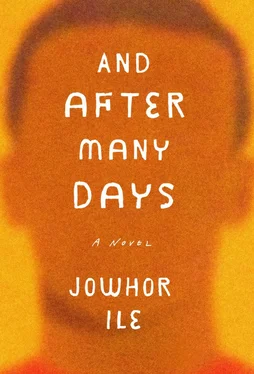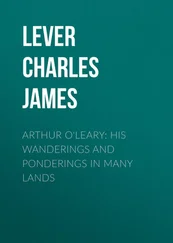—
Their grandfather’s name was Thomas Awari Utu. He took the name Thomas when he began his education in the Native Infant School at Omoku. But he was no infant at the time. This was 1911, and Awari was thirteen years of age. The story of how he began his education had become part of their family legend.
One day a slave in his father’s household had persuaded Awari to join him at the new school that had opened at Ogbo Onosi, on the eastern bank of Omoku River. Slaves were compelled to turn up at school to make up the attendance quota imposed by warrant chiefs. Freeborn, however, were allowed to do as they liked. The trek to Omoku would take roughly one hour if they traveled through the forest. Back then, Bendic informed the children, the British colonial government hadn’t registered as firm a presence in Ali-Ogba as it had in other parts of the region. The swamps were too treacherous. So while Anglican and Catholic missions wrestled each other and schemed for converts, and tax collectors came down heavily on farmers in other parts of the region, Ali-Ogba was pretty much left alone and continued more or less undisturbed in its traditional ways. Now a native court had been set up in Omoku, and a school, which had the same premises as the new Anglican mission.
This was before they carved out the wide road that ran from Ahoada to Omoku; before various Christian missions set up shop and spread through the region with a zeal that put shrines to torch; long, long before the oil explorers appeared in their coveralls, hard hats, and jungle boots, tramping through the forests with government permits in their hands, muddying the clear water of the streams, scattering the fish, displeasing swimmers and fishermen alike. Pipelines did not crisscross the swamp. No huge gas flames flared.
So, here is Awari, thirteen years of age. Ajie imagines him in shorts only, no shirt, on this morning as they beat through the scrub and high forest. He and his slave, sidestepping the ponds and marshland and arriving, wide-eyed and with muddy feet, before the headmaster of the school, a man from Old Calabar named Ebok.
“You look like twins,” Ebok says as he looks up from his books and levels his eyes on the boys. “Didymus,” he pronounces, looking at Awari. “It’s the Latin word for double . Your name will be Thomas. You know the apostle of Christ Thomas Didymus?”
That was how their grandfather Awari got himself a Christian name and eventually an education.
—
When Thomas Awari died, there was a dispute regarding where he should be buried. The Seventh Day Mission, the first church in Ogibah, a church he was instrumental in planting, decided the body of their patriarch belonged to them. The parcel of land that the church sat on was his. Everyone knew he was devout. He was an elder in the church and husband to one wife. He never swore to anything, nor once, since becoming a convert, joined in celebrating the New Yam Festival. The church said his body was rightfully theirs; he should be buried on the church grounds next to the schoolyard, the school he founded that bore his name. But the elders of their onuobdo had their own mind. They didn’t pay attention to the churchmen. Their brother’s body was theirs, naturally, and what they chose to do with it was entirely their own business. They would bury the man in the earth of his former bedroom.
Bendic made it clear to both parties that he intended to bury his father in peace and without much delay. They could choose to cooperate or forget about participating. A compromise was reached: Bendic’s father was buried, after a traditional wake, in his bedroom, as was the custom for a man his age, but a Christian funeral service was held as well. Scriptures were read out loud into the clear morning air, hymns sung in their complete stanzas, but the family did the actual interment of the body. The casket was borne on the shoulders of the young men of their onuobdo, and the Seventh Day pastors trailed meekly behind in the funeral entourage.
From this single episode, Ajie decided, you could read the prognosis of their family’s downfall. He would trace lines, join them in his moments of confusion, and arrive at solid conclusions. Their grandfather, who gave his entire adult life to the running of a church and school, could not, in his death, be fully claimed by them. He who rejected, in life, the old ways for the new; in death had his body prepared by men who sipped, gurgled, and spat twice at the shrine of Ntite. Draw yourself a straight line, walk backward on it to erase your footsteps, and you will trip and crack your skull. Straddle the two sides of a stream and you will unhinge your hips. Be unstable as water and you will not excel.
So here they all were, sitting at the dining table, feeling satisfied after eating Ma’s delicious pancakes. It was Easter break, and as expected for that time of year, there was a light shower of rain outside. Bendic and Ma looked thoroughly pleased with themselves, and Ajie couldn’t account for the reason why. They looked like they might just get up, link hands, and go for a stroll — if the rain abated — up and down the driveway, after which Bendic might grow thoughtful and unreachable, retreating into his study, or he might be inspired to take an afternoon nap in the bedroom, where Ma would join him and they would be private. Or Ma, being an occasional Bible reader, would search out her King James and make scriptural recommendations to Bendic and the children. She sometimes favored those poetic verses in the books of Proverbs and Ecclesiastes that extolled the virtues of a Good Woman: The virtuous woman commands her household after her in the way of the Lord. Early she rises and by night her lamp still burns, her hands never idle. It was the sort of afternoon when Ma might decide to engage herself in needlework, mending clothes for her family; in fact, she was about to send Bibi to fetch her sewing kit when Paul nearly blew up the house with his angry outburst.
How did his voice get so deep and big and no one noticed? He had only just turned eleven. Ajie was seven and Bibi was somewhere in between.
“I hate my school!” Paul roared. “I will die if I go back there.”
And for no reason at all.
Bendic and Ma snapped back into the new reality unfolding before them. Ajie reclined in his chair, waiting for the action to begin. Bibi didn’t seem moved. She’d had it up to here in the past few days with Paul’s moodiness. Now he was just shamelessly seeking attention.
Any other parent — which was to say any normal parent — would have smacked Paul for such a display of ingratitude (do you not know that there are plenty of children who would give an arm in this country to get a good education?). Any other parent would have narrowed his eyes and issued a simple warning—“Let me not hear that nonsense again”—but Bendic just looked up at Paul and asked: “Why? Why do you hate your school?”
Ma didn’t wait for Paul to respond. “If you are being bullied, I am going straight to your principal on Monday.”
“I don’t want to go to a day school,” Paul began, but the Power Authority interrupted, the bulbs in the parlor lit up, and Bibi shrieked with joy, “NEPA!” She leaped to the TV and radio and turned both on at once, the volume drowning all of their concerns for a few seconds, until Ma snapped, “Turn them off!”
Paul’s outburst was forgotten until the next morning.
The children are all dressed for school and having breakfast. Ma is looking at her watch; she has to drop Paul at his school before she heads to work. Bibi and Ajie will go with Bendic in his car, but right now Paul is in the bedroom, his meal untouched. “Paul, your food is getting cold. I don’t want to be late, please. The traffic on Aba Road is something else these days.”
Читать дальше












